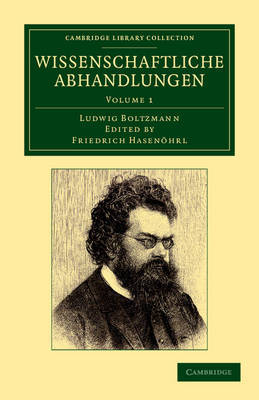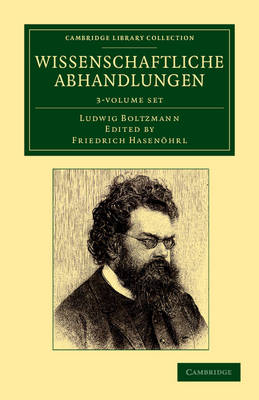Cambridge Library Collection - Physical Sciences
1 primary work • 5 total works
Volume 1
The Austrian physicist Ludwig Eduard Boltzmann (1844–1906), educated at the University of Vienna, was appointed professor of mathematical physics at the University of Graz in 1869 at the age of only twenty-five. Boltzmann did important work in the fields of statistical mechanics and statistical thermodynamics; for instance, he contributed to the kinetic theory concerned with molecular speeds in gas. Boltzmann also promoted atomic theory, which at the time was still highly controversial. He was a member of the Imperial Austrian Academy of Sciences from 1885 and became a member of the Royal Swedish Academy of Sciences in 1888. This three-volume work, prepared in 1909 by the physicist Fritz Hasenöhrl, one of Boltzmann's students, comprises all his academic publications from 1865 to 1905. Volume 1 contains papers from 1865 to 1874, including work on the movement of electricity, the theory of heat, and atoms in gases.
The Austrian physicist Ludwig Eduard Boltzmann (1844-1906), educated at the University of Vienna, was appointed professor of mathematical physics at the University of Graz in 1869 at the age of only twenty-five. Boltzmann did important work in the fields of statistical mechanics and statistical thermodynamics; for instance, he contributed to the kinetic theory concerned with molecular speeds in gas. Boltzmann also promoted atomic theory, which at the time was still highly controversial. He was a member of the Imperial Austrian Academy of Sciences from 1885 and became a member of the Royal Swedish Academy of Sciences in 1888. This three-volume work, prepared in 1909 by the physicist Fritz Hasenoehrl, one of Boltzmann's students, comprises all his academic publications from 1865 to 1905.
The Austrian physicist Ludwig Eduard Boltzmann (1844–1906), educated at the University of Vienna, was appointed professor of mathematical physics at the University of Graz in 1869 at the age of only twenty-five. Boltzmann did important work in the fields of statistical mechanics and statistical thermodynamics; for instance, he contributed to the kinetic theory concerned with molecular speeds in gas. Boltzmann also promoted atomic theory, which at the time was still highly controversial. He was a member of the Imperial Austrian Academy of Sciences from 1885 and became a member of the Royal Swedish Academy of Sciences in 1888. This three-volume work, prepared in 1909 by the physicist Fritz Hasenöhrl, one of Boltzmann's students, comprises all his academic publications from 1865 to 1905. Volume 2 contains work from 1875 to 1881 on the thermal conduction of gases, the mechanic theory of heat and its problems, and the friction of gas.
The Austrian physicist Ludwig Eduard Boltzmann (1844–1906), educated at the University of Vienna, was appointed professor of mathematical physics at the University of Graz in 1869 at the age of only twenty-five. Boltzmann did important work in the fields of statistical mechanics and statistical thermodynamics; for instance, he contributed to the kinetic theory concerned with molecular speeds in gas. Boltzmann also promoted atomic theory, which at the time was still highly controversial. He was a member of the Imperial Austrian Academy of Sciences from 1885 and became a member of the Royal Swedish Academy of Sciences in 1888. This three-volume work, prepared in 1909 by the physicist Fritz Hasenöhrl, one of Boltzmann's students, comprises all his academic publications from 1865 to 1905. Volume 3 contains papers from 1882 to 1905, including work on gas diffusion and thermodynamics.
The Austrian physicist Ludwig Eduard Boltzmann (1844–1906), educated at the University of Vienna, was appointed professor of mathematical physics at the University of Graz in 1869 at the age of only twenty-five. Boltzmann did important work in the fields of statistical mechanics and statistical thermodynamics; for instance, he contributed to the kinetic theory concerned with molecular speeds in gas. Boltzmann also promoted atomic theory, which at the time was still highly controversial. He was a member of the Imperial Austrian Academy of Sciences from 1885 and became a member of the Royal Swedish Academy of Sciences in 1888. This three-volume work, prepared in 1909 by the physicist Fritz Hasenöhrl, one of Boltzmann's students, comprises all his academic publications from 1865 to 1905. Volume 1 contains papers from 1865 to 1874, including work on the movement of electricity, the theory of heat, and atoms in gases.


